Dog Oral Care Tips : Keeping your dog’s teeth healthy is more than just preventing bad breath—it’s essential for overall well-being. Many pet owners overlook the importance of proper dental hygiene, which can lead to gum disease, plaque buildup, and painful infections. With simple steps, you can maintain your dog’s oral health and avoid costly veterinary procedures.
From choosing the right toothbrush and toothpaste to incorporating chew toys and a balanced diet, effective Dog Oral Care Tips help ensure your furry friend stays happy and healthy. Learning these tips early creates a routine that benefits your dog for life. (Dog Oral Care Tips)
Why Dog Oral Health Matters
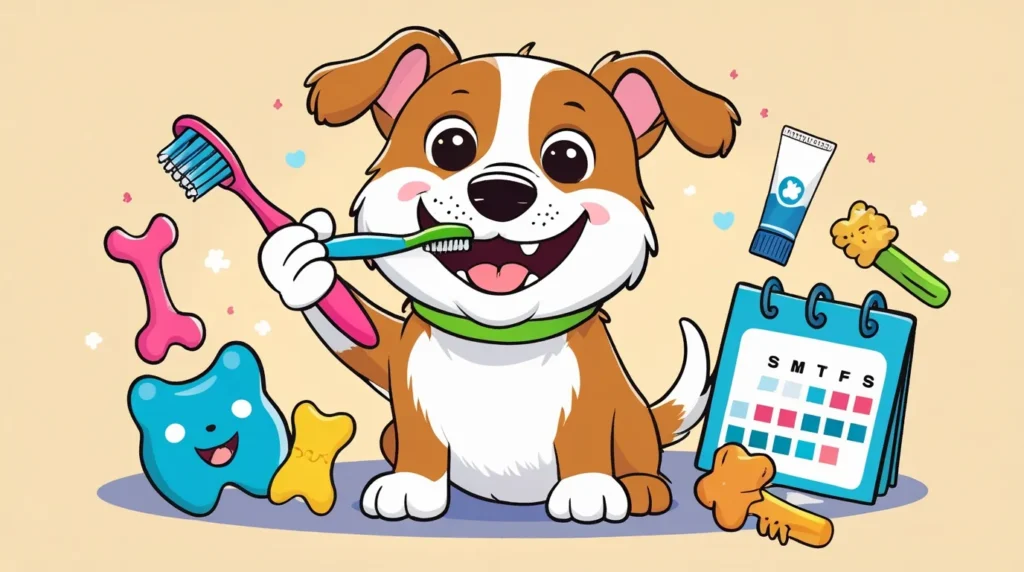
Maintaining your dog’s dental hygiene is essential for overall well-being. Poor oral care can lead to gum disease, tooth decay, and bad breath. Regular care not only protects their teeth but also prevents serious health complications like infections that may affect the heart or kidneys.
Healthy teeth mean a happy dog. When you invest time in brushing and checkups, you improve their quality of life and reduce veterinary costs in the long run.
Common Dental Problems in Dogs
Dogs often develop plaque buildup, tartar, and gingivitis. Signs include persistent bad breath, drooling, or difficulty chewing. Ignoring these issues can lead to tooth loss and painful infections.
Early detection is crucial. Regular oral exams help catch problems before they worsen, keeping your dog comfortable and healthy.
Best Dog Toothbrushes and Toothpaste
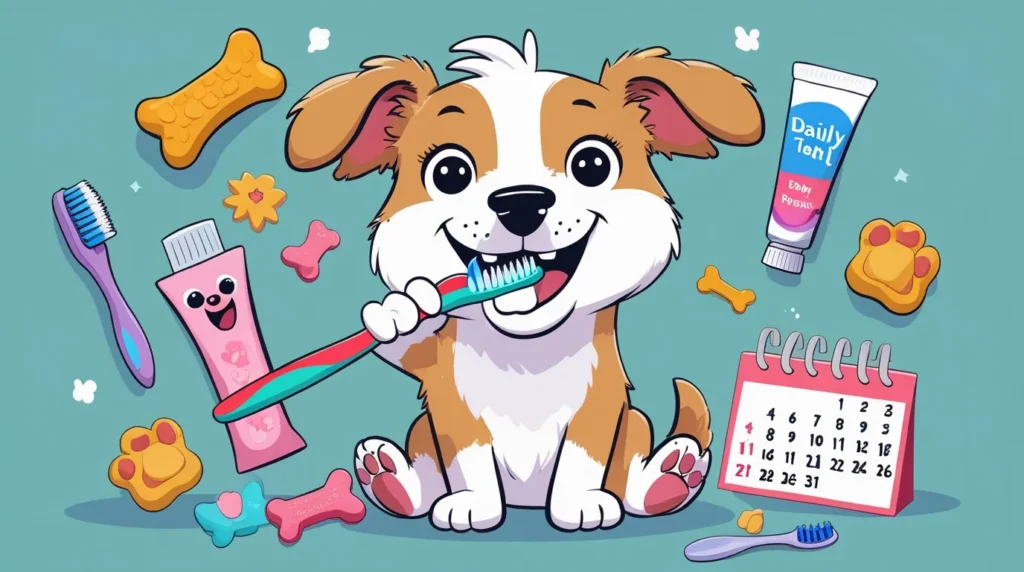
Use a soft-bristled dog toothbrush designed for their mouth size. Never use human toothpaste, as it can be toxic. Vet-approved toothpaste often comes in flavors like chicken or peanut butter, making brushing easier.
Brushing 2–3 times a week removes plaque and prevents tartar buildup. Consistent use ensures long-lasting oral health benefits for your dog.
How to Brush Your Dog’s Teeth Properly
Start slowly and gently lift the dog’s lips. Brush in small circular motions, covering all surfaces. Reward your dog with praise or treats to make brushing a positive experience.
Consistency is key. Over time, your dog will enjoy the routine, making dental care stress-free for both of you.
Dental Chews and Toys for Dogs
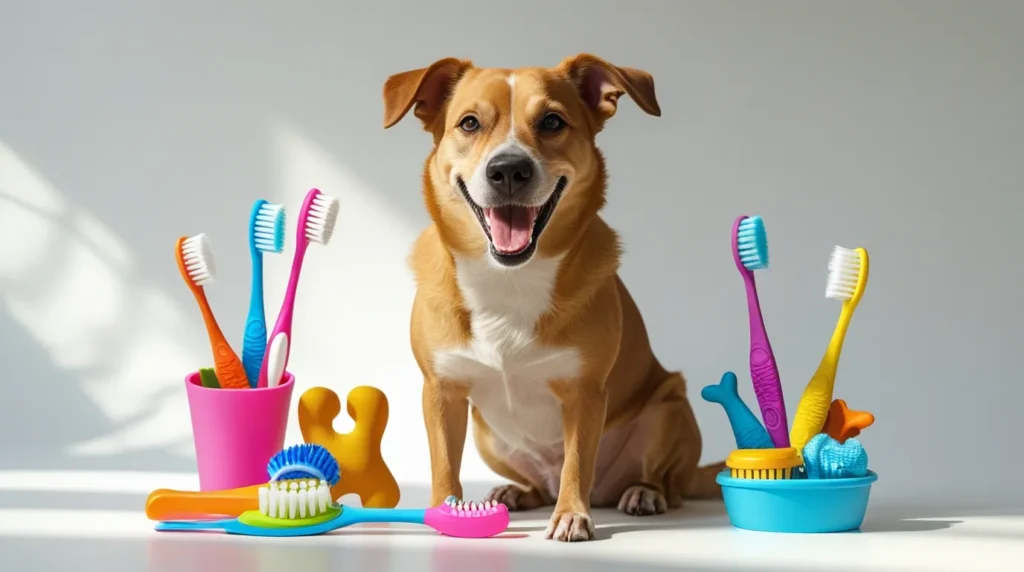
Chews and toys help naturally reduce plaque and tartar. Choose vet-approved dental toys that are safe and durable. Chewing strengthens the jaw and encourages healthy oral habits.
Rotate toys regularly to maintain interest. Chews are a fun supplement to brushing, not a replacement.
Healthy Diet for Dental Health
Dry kibble can help scrape away plaque, while treats rich in calcium and vitamin C support strong teeth and gums. Avoid sugary snacks that lead to tooth decay.
Balanced nutrition is essential. A proper diet works hand-in-hand with brushing and chews to keep your dog’s mouth healthy.
Signs Your Dog Needs a Vet Checkup
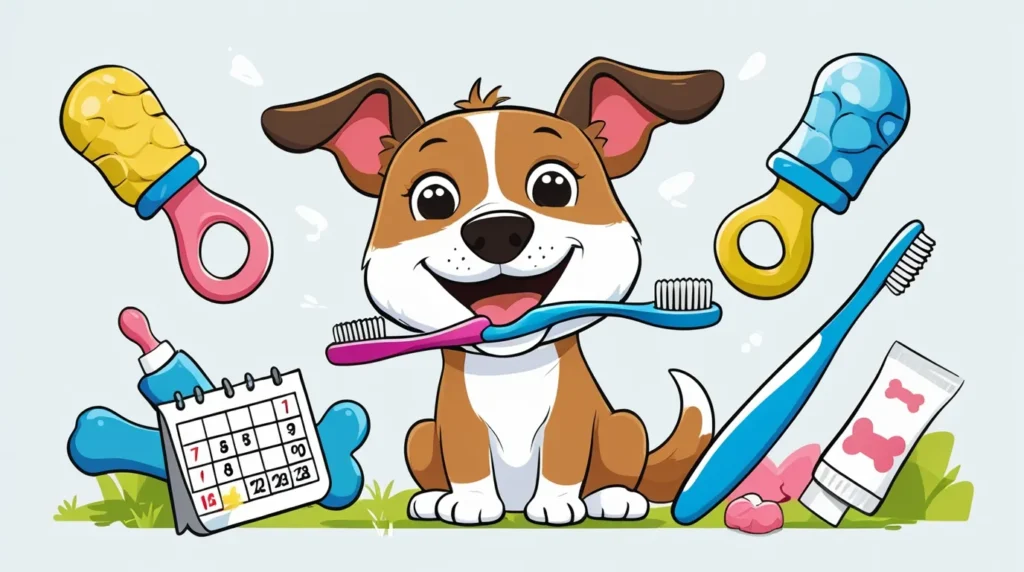
Watch for bleeding gums, swollen mouths, or trouble eating. Persistent bad breath may indicate serious dental problems. Early intervention can prevent costly procedures and reduce discomfort.
Regular checkups ensure minor issues don’t turn into major health risks.
Professional Dental Cleaning Options
Veterinarians offer cleaning under anesthesia to safely remove tartar. Procedures like scaling, polishing, and preventive care maintain healthy teeth and gums.
Dogs prone to periodontal disease benefit most from professional attention. Combine professional care with home brushing for best results.
DIY Oral Care at Home (Dog Oral Care Tips)
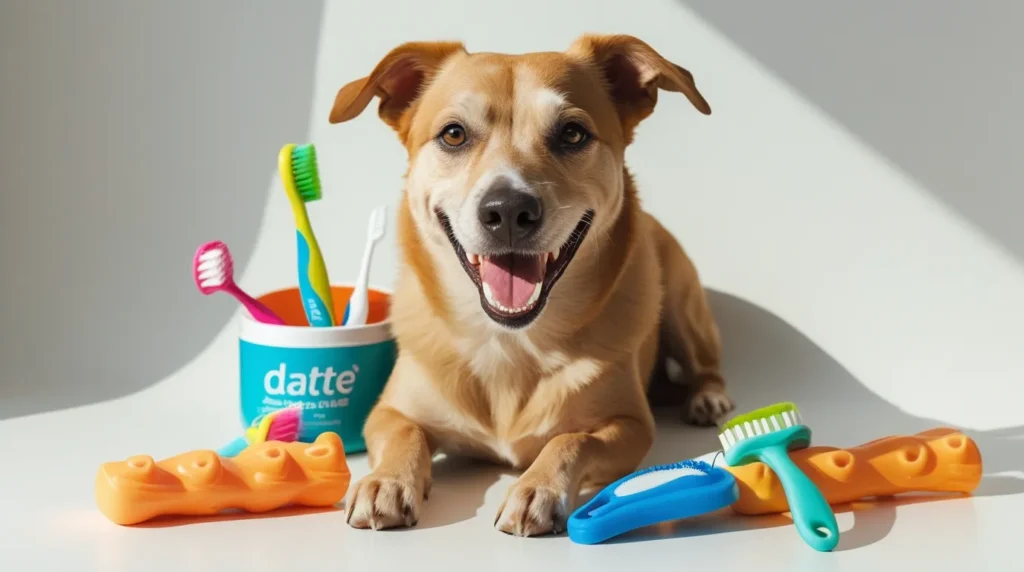
In addition to brushing, try water additives, dental wipes, and healthy chews. Small daily efforts prevent plaque buildup and maintain fresh breath.
Even simple routines like a quick brush or chew session make a significant difference over time.
Tips for Making Dental Care Fun
Turn brushing into a bonding activity. Praise your dog, offer treats, and use fun toys to reward good behavior. Gradually increase brushing time for a stress-free routine.
A happy dog and positive reinforcement make oral care enjoyable, creating long-term dental health habits.
FAQs
Q: What is the best oral care routine for dogs?
Brush your dog’s teeth 2–3 times a week with vet-approved toothpaste and provide dental chews regularly. Combine this with annual vet checkups for healthy teeth.
Q: How to improve dog oral hygiene?
Use daily brushing, dental chews, and water additives. Ensure a balanced diet and regular vet visits to prevent plaque and tartar.
Q: What is the 333 rule for brushing teeth?
Brush teeth 3 times a day for 3 minutes each time, using a soft-bristled toothbrush and proper toothpaste.
Q: What is the best way to take care of a dog’s teeth?
Combine brushing, dental toys, and regular vet cleanings. Monitor for bad breath, gum issues, and plaque buildup.
Q: Can coconut oil clean dog teeth?
Yes, applying a small amount of coconut oil can help reduce plaque and improve gum health.
Q: Do carrots clean dogs’ teeth?
Yes, raw carrots act as natural chew toys that scrape off plaque and strengthen teeth.
Q: What foods naturally clean dog teeth?
Crunchy vegetables like carrots, celery, and specially formulated dental kibbles help naturally clean teeth.
Q: How to clean dog mouth after eating poop?
Rinse their mouth with dog-safe mouthwash or warm water and brush teeth if possible.
Q: Are carrots good for dogs?
Yes, carrots are safe, healthy, low-calorie treats that help clean teeth naturally.
Q: What is the Korean brushing technique?
Brush in circular motions along the gum line, using gentle strokes and proper positioning to remove plaque effectively.
Q: What is the Leonard method of brushing teeth?
A method focusing on thorough, systematic brushing of all tooth surfaces, often used in professional dental care.
Q: Is brushing 3 times a day over brushing?
Not necessarily, if done gently with proper technique, brushing 3 times a day is safe and effective.
Q: How to disinfect a dog’s mouth?
Use dog-safe antiseptic rinses or dental gels, avoiding human products that can be toxic.
Q: What vitamin does a dog need to stop eating poop?
Dogs may benefit from B vitamins, particularly B1 and B6, to reduce coprophagia.
Q: How to give a dog warm salt water rinse?
Mix 1 tsp salt in 1 cup warm water, let your dog sip gently or use a clean cloth to wipe teeth.
Q: What is a dog lacking if he eats poop?
Possible deficiencies include fiber, digestive enzymes, or certain vitamins, but behavioral reasons can also cause it.
Q: What is the best multivitamin for dogs?
A vet-approved balanced multivitamin containing vitamins A, C, D, E, and B complex supports overall health.
Q: Why does pineapple stop dogs from eating poop?
Pineapple contains enzymes that make feces taste unpleasant, reducing coprophagia behavior.
Q: How should I prepare pineapple for my dog?
Peel, remove the core, and serve small fresh pieces—avoid canned or sweetened pineapple.
Q: What fruit stops dogs from eating poop?
Pineapple and papaya are most effective due to enzymes that deter coprophagia.
Q: Can dogs have coconut water?
Yes, in small amounts, coconut water is safe and hydrating, but avoid sweetened or flavored versions.




